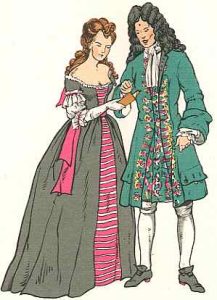Contents
Contents
Mrs. Hancock was one of those, who, at Cambridge, extended courtesies to the ladies of Burgoyne’s army, when under the convention of surrender. She was the daughter of Edmund Quincy, of Massachusetts, and was born in 1750. At the age of twenty-four she was married to one of the greatest men of the age. The honor that encircled the name of John Hancock received added lustre from the fair partner of his fortunes. Moving in the best circles of society, and a leader in taste and fashion, she filled her illustrious station with dignity, and dispensed with grace the hospitalities of her house. There might be seen at her table all classes; the grave clergy, the veteran and the gay and the gifted in song, or anecdote, or wit. The social customs of the day savored of profusion. It was a practice in families of respectability, to have a tankard of punch made in the morning, of which visitors during the day were invited to partake.
Dinners and suppers were frequently interchanged: and the tables were loaded with provision. The dinner hour was at one or two o’clock; and three was the latest for formal occasions. The evening amusement was usually a game at cards; and dancing was much in vogue. There were concerts; but theatrical amusements were prohibited. Much attention was paid to dress; and coats various in color were worn.
Mrs. Hancock was not only admirable in the pleasing duties of mistress of her household, but in hours of disease and pain soothed her husband and calmed his sensitive and irritable temper. She had her share, too, in the terrors and dangers of the war. When the British made their attack at Lexington and Concord, she was at the latter place with Mr. Hancock, and fled with him to Woburn. Many a scene of Revolutionary days, in which she was herself an actor or a spectator, she was accustomed to depict in after years. She would often describe the appearance and manners of the British officers who had been quartered in Boston, dwelling particularly on the military virtue of Earl Percy, who slept in a tent among his soldiers encamped on the Common in the winter of 1774-5, and whose voice could be heard at the dawn of day, drilling his troops.
During the life of her husband, Mrs. Hancock was of necessity much in the gay world, in which she occupied a position so distinguished. After his death she married Captain Scott, with whom she passed a less brilliant, yet not a less happy life. Her later years were spent in seclusion. She was still, however, surrounded by friends who were instructed and charmed by her superior mind, and cheerful conversation. She went but little into society, and whenever she appeared, was received with great attention. La Fayette, on his visit to this country, called upon her, and many spoke of the interesting interview witnessed between “the once youthful chevalier and the splendid belle.”
She died in her seventy-eighth year. Several anecdotes are told of her sprightliness, good sense, and benevolence, but unfortunately cannot be obtained in a form sufficiently authentic for this sketch.


